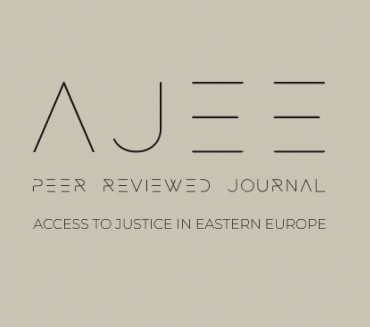Summary: 1. Introduction. – 2. Methodological Framework. – 3. Child’s Rights in European Countries and Policies. – 4. Administrative and Legal Protection of Child's Rights in Kazakhstan. – 5. Conclusions.

Summary: 1. Introduction. – 2. Methodological Framework. – 3. Child’s Rights in European Countries and Policies. – 4. Administrative and Legal Protection of Child's Rights in Kazakhstan. – 5. Conclusions.
Juvenile justice is an essential element of the development of social justice provision for minors in all countries, thus enhancing the safety of youth and the maintenance of order in society. The aim of the research is to analyse the theoretical provisions and legal norms governing the administrative and legal protection of minors in European countries. It is also to formulate proposals and recommendations for the modernization of the legal framework for juvenile justice institutions’ functioning in the Republic of Kazakhstan. According to the set goal and objectives, a range of general and special research methods were used for a comprehensive analysis. The theoretical and practical significance of the article is determined by its relevance and novelty, with its focus on solving the most important problems facing protection of minors’ rights in the judicial process.
Marat Musabayev
Senior Lecturer, PhD (Law), Innovative Eurasian University, Faculty of Business, Education and Law, Department of Law, Kazakhstan marat_musabayev@sci-academy.cc https://orcid.org/0000-0001-9995-0660
Corresponding author, responsible for writing and submission, study preparing, responsible for ensuring that the descriptions and the manuscript are accurate and agreed by all authors. Competing interests: the authors declare that there is no potential conflictof interest related to the article. Disclaimer: The authors declare that their opinions and views expressed in this manuscript are free of any impact of any organizations.
Guldana Abenova
Senior Lecturer, PhD (Law), Innovative Eurasian University, Faculty of Business, Education and Law, Department of Law, Kazakhstan guldana_abenova@sci-academy.cc https://orcid.org/0000-0003-4134-277
Co-author, responsible for data collection and writing.
Serik Zhetpisov
Professor, Dr. Sc. (Law), Associate Professor, Eurasian Law Academy. D.A. Kunaev, Department of Constitutional, International and Customs Law, Kazakhstan serik_zhetpisov@sci-academy.cc https://orcid.org/0000-0002-4945-438
Co-author, responsible for data collection and writing.
Gulnar Alibayeva
Vice-Rector for Research, Doctor of Law, Associate Professor, Eurasian Law Academy. D.A. Kunaev, Department of Constitutional, International and Customs Law, Kazakhstan alibayeva8215@sci-univ.com https://orcid.org/0000-0003-0325-9248 Co-author,responsible for data collection and writing.
Kultay Adylova
Vice-Rector for Academic and Scientific Affairs, PhD in Law, Associate Professor, International University of Tourism and Hospitality, Kazakhstan kultay_adylov@acu-edu.cc https://orcid.org/0000-0001-6909-4509
Co-author, responsible for data collection and writing.
Translation: The content of this article was translated with the participation of third parties under the authors’ responsibility.
Managing editor – Mag Polina Siedova. English Editor – Nicole Robinson.
Copyright: © 2023 Marat Musabayev, Guldana Abenova, Serik Zhetpisov, Gulnar Alibayeva, Kultay Adylova. This is an open access article distributed under the terms of the Creative Commons Attribution License, (CC BY 4.0), which permits unrestricted use, distribution, and reproduction in any medium, provided the original author and source are credited.
1. Alibayeva GA and Razzak N, ‘Juvenile Justice in Central Asia: Current Status and the Possibility of Using the European Model’ (2015) 6 (5) Mediterranean Journal of Social Sciences 139.
2. Kratcoski P, Kratcoski LD and Kratcoski PC, Juvenile delinquency: theory, research, and the juvenile justice process (6th edn, Springer 2020) doi: 10.1007/978-3-030-31452-1.
3. Liakopoulos D, ‘Interactions Between European Court of Human Rights and Private International Law of European Union’ (2018) 10 (1) Cuadernos de Derecho Transnacional 248, doi: 10.20318/cdt.2018.4123.
4. Liefaard T and Kilkelly U, ‘Child-Friendly Justice: Past, Present and Future’ in Goldson B (ed), Juvenile Justice in Europe: Past, Present and Future (Routledge 2019) ch 4, 57.
5. Lievens E and others, ‘Children’s Rights and Digital Technologies’ in Kilkelly U and Liefaard T (eds), International Human Rights of Children (Springer Singapore 2018) 487, DOI: 10.1007/978-981-10-4184-6_16.
6. Neuwahl NA and Rosas A (eds), The European Union and Human Rights (Martinus Nijhoff 1995).
7. Omarova A and Vlasenko S, ‘International Standards of Juvenile Justice: Its Creation and Impact on Ukrainian Legislation’ (2022) 5 (1) Access to Justice in Eastern Europe 116, doi: 10.33327/AJEE-18-5.1-n000100.
8. Sloot B, Hoofnagle CJ and Borgesius FJZ, ‘The European Union General Data Protection Regulation: What it is and what it means’ (2019) 28 (1) Information & Communications Technology Law 65, doi: 10.1080/13600834.2019.1573501.
9. Suleimenova G, ‘Judicial protection of the rights and legitimate interests of minors’ (2003) 4 World of Law 11.
10. Zhetpisbaev BA and others, Conceptual and Legal Foundations of Juvenile Justice (Kazakh University 2019).
Марат Мусабаєв, Гульдана Абенова, Серік Жетпісов, Гульнар Алібаєва,
АНОТАЦІЯ
Ювенальна юстиція є важливим елементом розвитку системи забезпечення
соціальної справедливості для неповнолітніх у всіх країнах, що сприяє
підвищенню безпеки молоді та підтриманню порядку в суспільстві. Метою
дослідження є аналіз теоретичних положень та правових норм, що регулюють
адміністративно-правовий захист неповнолітніх у країнах Європи. А також
сформулювати пропозиції та рекомендації щодо модернізації правової бази
функціонування інститутів ювенальної юстиції в Республіці Казахстан.
Відповідно до поставленої мети та завдань для комплексного аналізу було
застосовано комплекс загальнонаукових і спеціальних методів дослідження.
Теоретична та практична значущість статті визначається її актуальністю
і новизною, спрямованістю на вирішення найважливіших проблем захисту
прав неповнолітніх у судовому процесі. Міжнародна спільнота,
усвідомлюючи важливість дитинства для суспільного прогресу та свого
майбутнього, виробила концепцію дитинства як одного з найцінніших
періодів життя. Міжнародні нормативно-правові акти зосереджені
здебільшого на переважному захисті прав дитини. Правовий статус дітей
сьогодні визначається широким міжнародним законодавством про захист
прав дитини. Безперечно, що первинні міжнародно-правові джерела в цій
сфері є універсальними, а регіональні міжнародні акти проголошують права і
свободи людини. Питання захисту прав дитини є одним із основоположних
напрямків діяльності, якому Європейський Союз та ООН приділяють час,
адже турбота про дітей означає турботу про майбутні покоління — про
продовження людської цивілізації. За останні роки міжнародна спільнота
розробила широкий спектр договорів щодо захисту прав та інтересів дітей,
що дозволяє стверджувати про певну стабільність міжнародної системи
стандартів. Реалії сьогодення змушують нас замислитися над поведінкою
неповнолітніх у правовому полі. Соціальна трансформація спричиняє зміни в
їхній поведінці в міру дорослішання.
Submitted on 1 Dec 2022 / Revised 1st 11 Dec 2023 / Revised 2nd 18 Feb 2023 / Approved 9 Mar 2023 / Published: 15 May 2023